Annotated Bibliography: Knowledge Sharing, Trust, and Self-Efficacy
VerifiedAdded on 2023/06/04
|8
|2072
|489
Annotated Bibliography
AI Summary
This annotated bibliography analyzes the factors influencing knowledge sharing in virtual communities, drawing upon a key article examining the relationship between trust, self-efficacy, and outcome expectations. The analysis covers the article's purpose, target audience, subject matter, a...
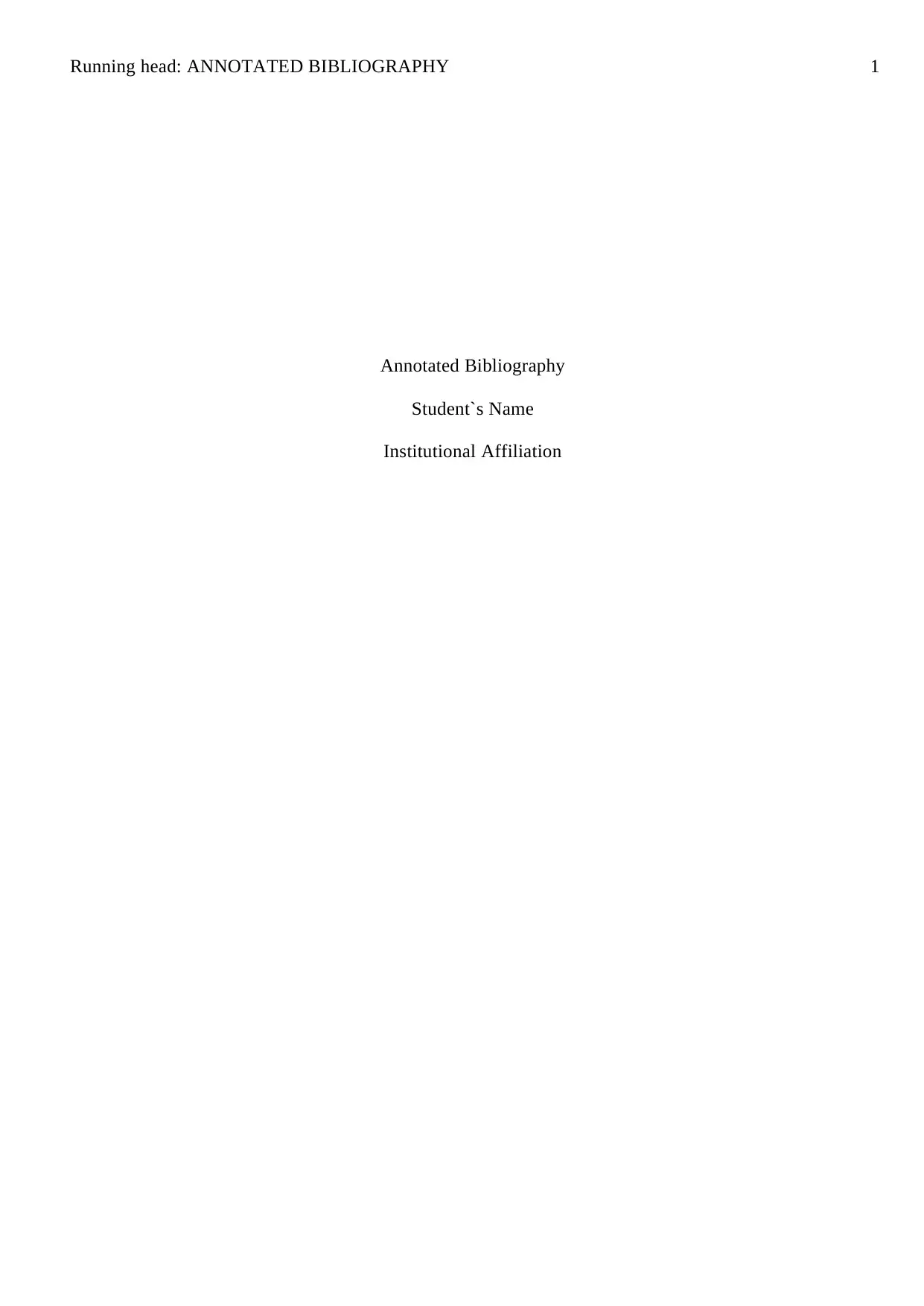
Running head: ANNOTATED BIBLIOGRAPHY 1
Annotated Bibliography
Student`s Name
Institutional Affiliation
Annotated Bibliography
Student`s Name
Institutional Affiliation
Paraphrase This Document
Need a fresh take? Get an instant paraphrase of this document with our AI Paraphraser
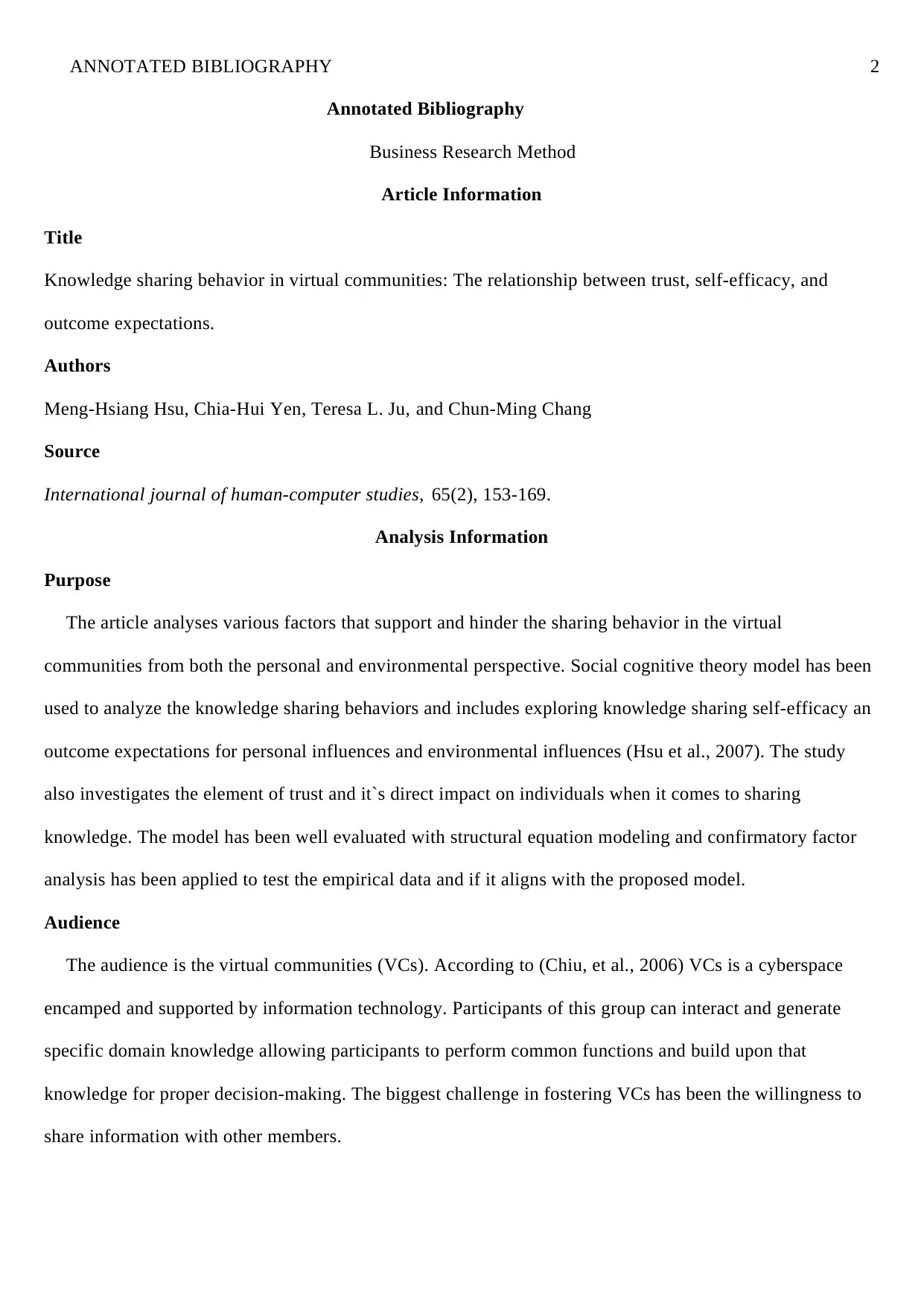
ANNOTATED BIBLIOGRAPHY 2
Annotated Bibliography
Business Research Method
Article Information
Title
Knowledge sharing behavior in virtual communities: The relationship between trust, self-efficacy, and
outcome expectations.
Authors
Meng-Hsiang Hsu, Chia-Hui Yen, Teresa L. Ju, and Chun-Ming Chang
Source
International journal of human-computer studies, 65(2), 153-169.
Analysis Information
Purpose
The article analyses various factors that support and hinder the sharing behavior in the virtual
communities from both the personal and environmental perspective. Social cognitive theory model has been
used to analyze the knowledge sharing behaviors and includes exploring knowledge sharing self-efficacy an
outcome expectations for personal influences and environmental influences (Hsu et al., 2007). The study
also investigates the element of trust and it`s direct impact on individuals when it comes to sharing
knowledge. The model has been well evaluated with structural equation modeling and confirmatory factor
analysis has been applied to test the empirical data and if it aligns with the proposed model.
Audience
The audience is the virtual communities (VCs). According to (Chiu, et al., 2006) VCs is a cyberspace
encamped and supported by information technology. Participants of this group can interact and generate
specific domain knowledge allowing participants to perform common functions and build upon that
knowledge for proper decision-making. The biggest challenge in fostering VCs has been the willingness to
share information with other members.
Annotated Bibliography
Business Research Method
Article Information
Title
Knowledge sharing behavior in virtual communities: The relationship between trust, self-efficacy, and
outcome expectations.
Authors
Meng-Hsiang Hsu, Chia-Hui Yen, Teresa L. Ju, and Chun-Ming Chang
Source
International journal of human-computer studies, 65(2), 153-169.
Analysis Information
Purpose
The article analyses various factors that support and hinder the sharing behavior in the virtual
communities from both the personal and environmental perspective. Social cognitive theory model has been
used to analyze the knowledge sharing behaviors and includes exploring knowledge sharing self-efficacy an
outcome expectations for personal influences and environmental influences (Hsu et al., 2007). The study
also investigates the element of trust and it`s direct impact on individuals when it comes to sharing
knowledge. The model has been well evaluated with structural equation modeling and confirmatory factor
analysis has been applied to test the empirical data and if it aligns with the proposed model.
Audience
The audience is the virtual communities (VCs). According to (Chiu, et al., 2006) VCs is a cyberspace
encamped and supported by information technology. Participants of this group can interact and generate
specific domain knowledge allowing participants to perform common functions and build upon that
knowledge for proper decision-making. The biggest challenge in fostering VCs has been the willingness to
share information with other members.
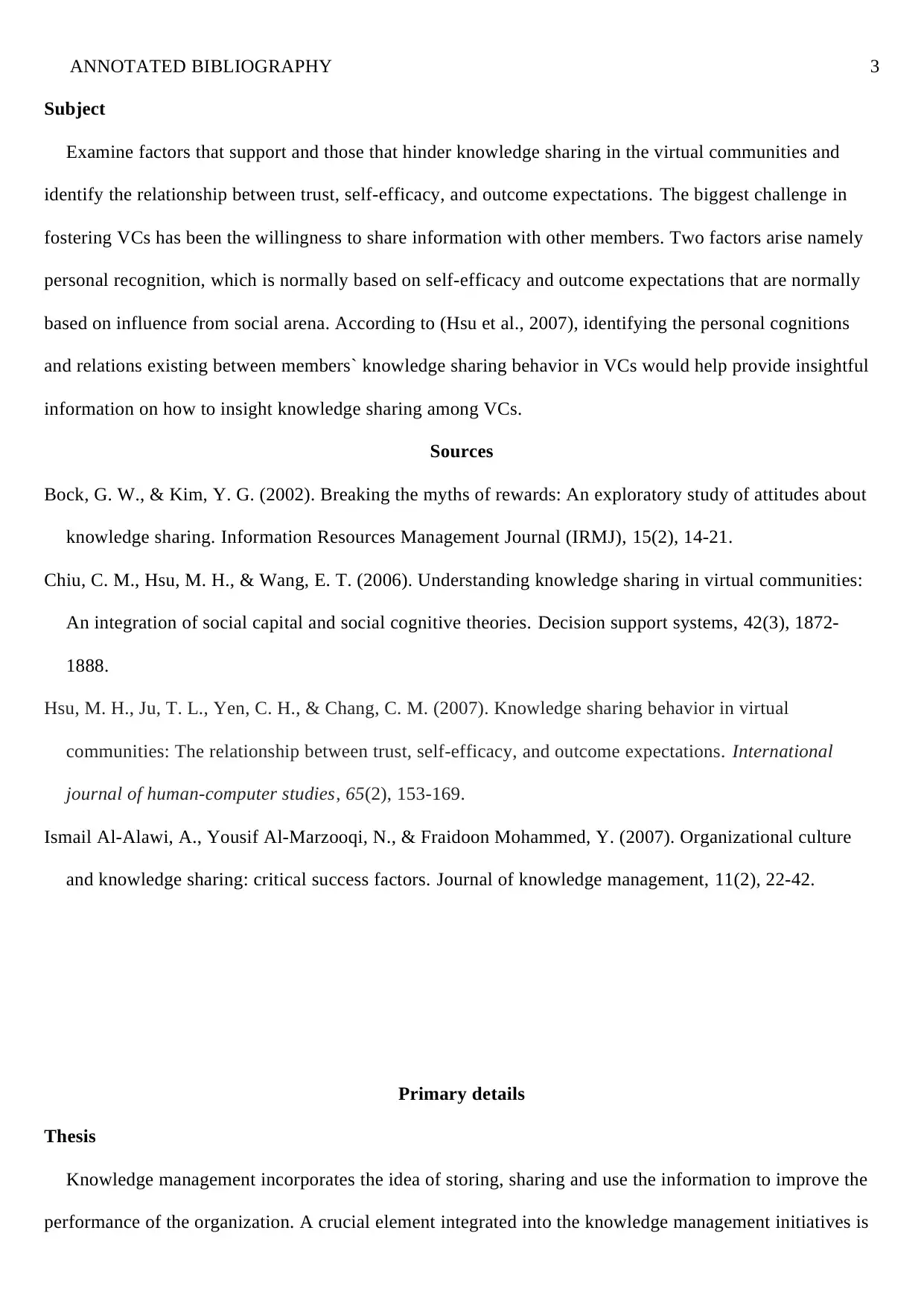
ANNOTATED BIBLIOGRAPHY 3
Subject
Examine factors that support and those that hinder knowledge sharing in the virtual communities and
identify the relationship between trust, self-efficacy, and outcome expectations. The biggest challenge in
fostering VCs has been the willingness to share information with other members. Two factors arise namely
personal recognition, which is normally based on self-efficacy and outcome expectations that are normally
based on influence from social arena. According to (Hsu et al., 2007), identifying the personal cognitions
and relations existing between members` knowledge sharing behavior in VCs would help provide insightful
information on how to insight knowledge sharing among VCs.
Sources
Bock, G. W., & Kim, Y. G. (2002). Breaking the myths of rewards: An exploratory study of attitudes about
knowledge sharing. Information Resources Management Journal (IRMJ), 15(2), 14-21.
Chiu, C. M., Hsu, M. H., & Wang, E. T. (2006). Understanding knowledge sharing in virtual communities:
An integration of social capital and social cognitive theories. Decision support systems, 42(3), 1872-
1888.
Hsu, M. H., Ju, T. L., Yen, C. H., & Chang, C. M. (2007). Knowledge sharing behavior in virtual
communities: The relationship between trust, self-efficacy, and outcome expectations. International
journal of human-computer studies, 65(2), 153-169.
Ismail Al-Alawi, A., Yousif Al-Marzooqi, N., & Fraidoon Mohammed, Y. (2007). Organizational culture
and knowledge sharing: critical success factors. Journal of knowledge management, 11(2), 22-42.
Primary details
Thesis
Knowledge management incorporates the idea of storing, sharing and use the information to improve the
performance of the organization. A crucial element integrated into the knowledge management initiatives is
Subject
Examine factors that support and those that hinder knowledge sharing in the virtual communities and
identify the relationship between trust, self-efficacy, and outcome expectations. The biggest challenge in
fostering VCs has been the willingness to share information with other members. Two factors arise namely
personal recognition, which is normally based on self-efficacy and outcome expectations that are normally
based on influence from social arena. According to (Hsu et al., 2007), identifying the personal cognitions
and relations existing between members` knowledge sharing behavior in VCs would help provide insightful
information on how to insight knowledge sharing among VCs.
Sources
Bock, G. W., & Kim, Y. G. (2002). Breaking the myths of rewards: An exploratory study of attitudes about
knowledge sharing. Information Resources Management Journal (IRMJ), 15(2), 14-21.
Chiu, C. M., Hsu, M. H., & Wang, E. T. (2006). Understanding knowledge sharing in virtual communities:
An integration of social capital and social cognitive theories. Decision support systems, 42(3), 1872-
1888.
Hsu, M. H., Ju, T. L., Yen, C. H., & Chang, C. M. (2007). Knowledge sharing behavior in virtual
communities: The relationship between trust, self-efficacy, and outcome expectations. International
journal of human-computer studies, 65(2), 153-169.
Ismail Al-Alawi, A., Yousif Al-Marzooqi, N., & Fraidoon Mohammed, Y. (2007). Organizational culture
and knowledge sharing: critical success factors. Journal of knowledge management, 11(2), 22-42.
Primary details
Thesis
Knowledge management incorporates the idea of storing, sharing and use the information to improve the
performance of the organization. A crucial element integrated into the knowledge management initiatives is
⊘ This is a preview!⊘
Do you want full access?
Subscribe today to unlock all pages.

Trusted by 1+ million students worldwide
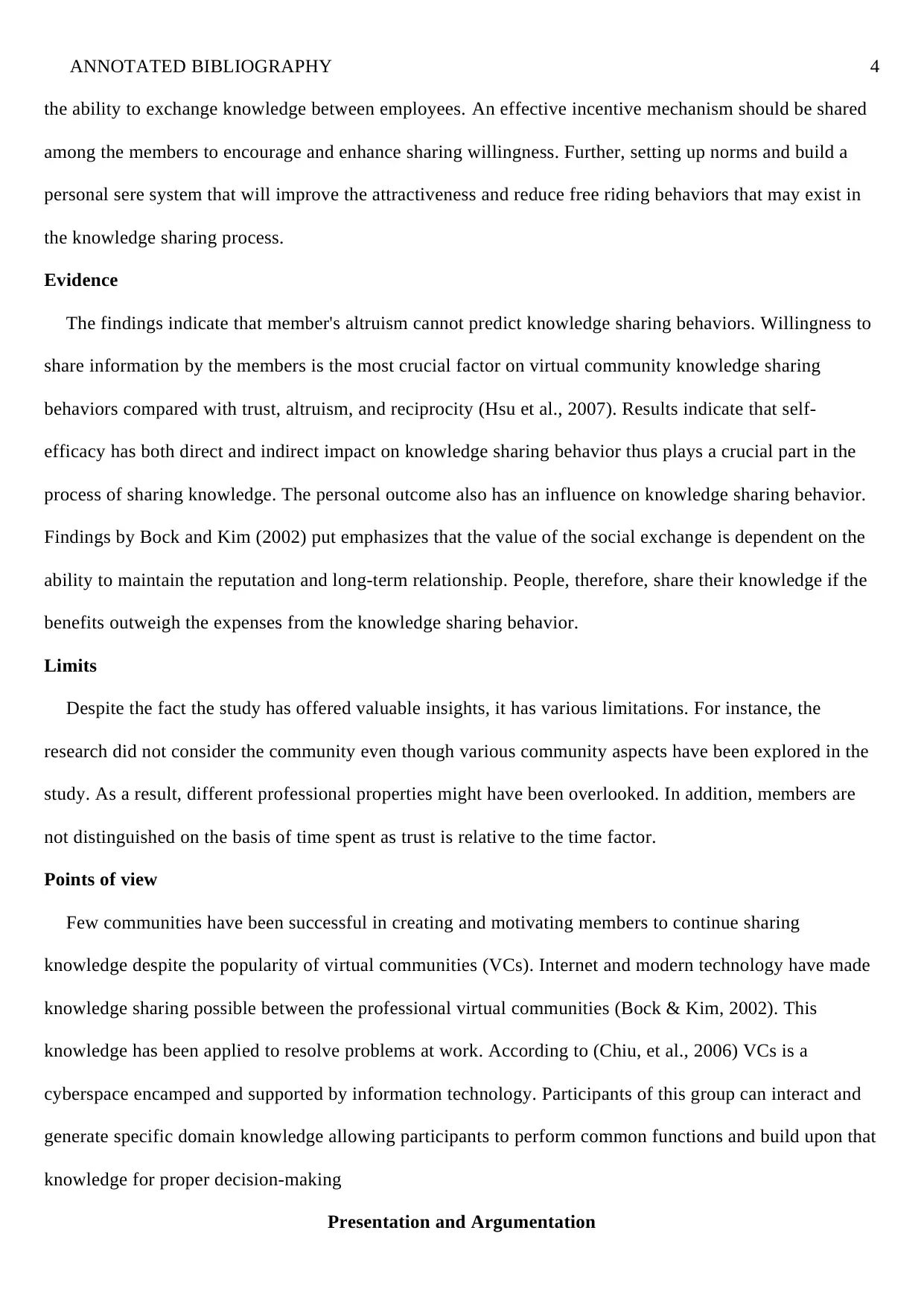
ANNOTATED BIBLIOGRAPHY 4
the ability to exchange knowledge between employees. An effective incentive mechanism should be shared
among the members to encourage and enhance sharing willingness. Further, setting up norms and build a
personal sere system that will improve the attractiveness and reduce free riding behaviors that may exist in
the knowledge sharing process.
Evidence
The findings indicate that member's altruism cannot predict knowledge sharing behaviors. Willingness to
share information by the members is the most crucial factor on virtual community knowledge sharing
behaviors compared with trust, altruism, and reciprocity (Hsu et al., 2007). Results indicate that self-
efficacy has both direct and indirect impact on knowledge sharing behavior thus plays a crucial part in the
process of sharing knowledge. The personal outcome also has an influence on knowledge sharing behavior.
Findings by Bock and Kim (2002) put emphasizes that the value of the social exchange is dependent on the
ability to maintain the reputation and long-term relationship. People, therefore, share their knowledge if the
benefits outweigh the expenses from the knowledge sharing behavior.
Limits
Despite the fact the study has offered valuable insights, it has various limitations. For instance, the
research did not consider the community even though various community aspects have been explored in the
study. As a result, different professional properties might have been overlooked. In addition, members are
not distinguished on the basis of time spent as trust is relative to the time factor.
Points of view
Few communities have been successful in creating and motivating members to continue sharing
knowledge despite the popularity of virtual communities (VCs). Internet and modern technology have made
knowledge sharing possible between the professional virtual communities (Bock & Kim, 2002). This
knowledge has been applied to resolve problems at work. According to (Chiu, et al., 2006) VCs is a
cyberspace encamped and supported by information technology. Participants of this group can interact and
generate specific domain knowledge allowing participants to perform common functions and build upon that
knowledge for proper decision-making
Presentation and Argumentation
the ability to exchange knowledge between employees. An effective incentive mechanism should be shared
among the members to encourage and enhance sharing willingness. Further, setting up norms and build a
personal sere system that will improve the attractiveness and reduce free riding behaviors that may exist in
the knowledge sharing process.
Evidence
The findings indicate that member's altruism cannot predict knowledge sharing behaviors. Willingness to
share information by the members is the most crucial factor on virtual community knowledge sharing
behaviors compared with trust, altruism, and reciprocity (Hsu et al., 2007). Results indicate that self-
efficacy has both direct and indirect impact on knowledge sharing behavior thus plays a crucial part in the
process of sharing knowledge. The personal outcome also has an influence on knowledge sharing behavior.
Findings by Bock and Kim (2002) put emphasizes that the value of the social exchange is dependent on the
ability to maintain the reputation and long-term relationship. People, therefore, share their knowledge if the
benefits outweigh the expenses from the knowledge sharing behavior.
Limits
Despite the fact the study has offered valuable insights, it has various limitations. For instance, the
research did not consider the community even though various community aspects have been explored in the
study. As a result, different professional properties might have been overlooked. In addition, members are
not distinguished on the basis of time spent as trust is relative to the time factor.
Points of view
Few communities have been successful in creating and motivating members to continue sharing
knowledge despite the popularity of virtual communities (VCs). Internet and modern technology have made
knowledge sharing possible between the professional virtual communities (Bock & Kim, 2002). This
knowledge has been applied to resolve problems at work. According to (Chiu, et al., 2006) VCs is a
cyberspace encamped and supported by information technology. Participants of this group can interact and
generate specific domain knowledge allowing participants to perform common functions and build upon that
knowledge for proper decision-making
Presentation and Argumentation
Paraphrase This Document
Need a fresh take? Get an instant paraphrase of this document with our AI Paraphraser
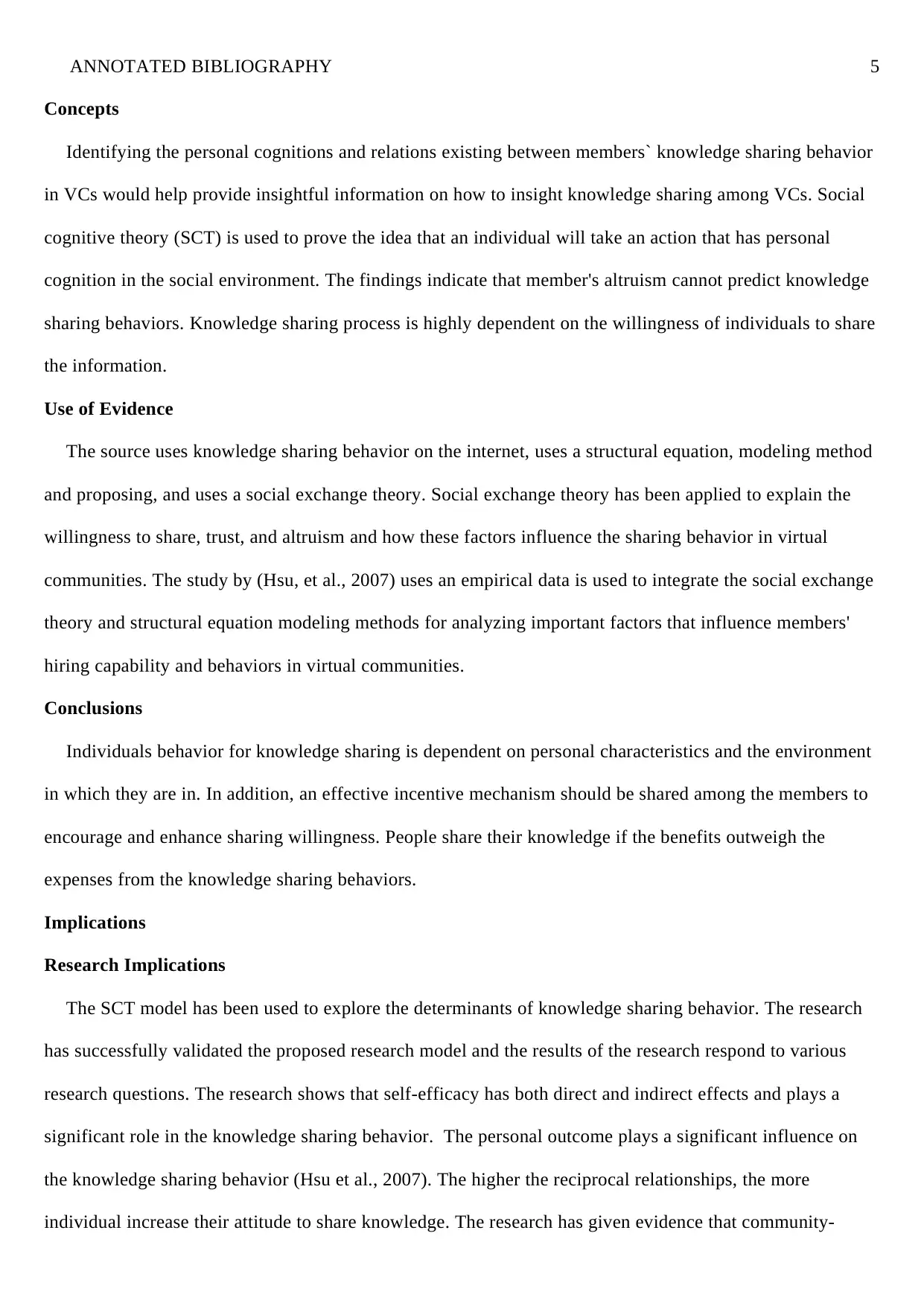
ANNOTATED BIBLIOGRAPHY 5
Concepts
Identifying the personal cognitions and relations existing between members` knowledge sharing behavior
in VCs would help provide insightful information on how to insight knowledge sharing among VCs. Social
cognitive theory (SCT) is used to prove the idea that an individual will take an action that has personal
cognition in the social environment. The findings indicate that member's altruism cannot predict knowledge
sharing behaviors. Knowledge sharing process is highly dependent on the willingness of individuals to share
the information.
Use of Evidence
The source uses knowledge sharing behavior on the internet, uses a structural equation, modeling method
and proposing, and uses a social exchange theory. Social exchange theory has been applied to explain the
willingness to share, trust, and altruism and how these factors influence the sharing behavior in virtual
communities. The study by (Hsu, et al., 2007) uses an empirical data is used to integrate the social exchange
theory and structural equation modeling methods for analyzing important factors that influence members'
hiring capability and behaviors in virtual communities.
Conclusions
Individuals behavior for knowledge sharing is dependent on personal characteristics and the environment
in which they are in. In addition, an effective incentive mechanism should be shared among the members to
encourage and enhance sharing willingness. People share their knowledge if the benefits outweigh the
expenses from the knowledge sharing behaviors.
Implications
Research Implications
The SCT model has been used to explore the determinants of knowledge sharing behavior. The research
has successfully validated the proposed research model and the results of the research respond to various
research questions. The research shows that self-efficacy has both direct and indirect effects and plays a
significant role in the knowledge sharing behavior. The personal outcome plays a significant influence on
the knowledge sharing behavior (Hsu et al., 2007). The higher the reciprocal relationships, the more
individual increase their attitude to share knowledge. The research has given evidence that community-
Concepts
Identifying the personal cognitions and relations existing between members` knowledge sharing behavior
in VCs would help provide insightful information on how to insight knowledge sharing among VCs. Social
cognitive theory (SCT) is used to prove the idea that an individual will take an action that has personal
cognition in the social environment. The findings indicate that member's altruism cannot predict knowledge
sharing behaviors. Knowledge sharing process is highly dependent on the willingness of individuals to share
the information.
Use of Evidence
The source uses knowledge sharing behavior on the internet, uses a structural equation, modeling method
and proposing, and uses a social exchange theory. Social exchange theory has been applied to explain the
willingness to share, trust, and altruism and how these factors influence the sharing behavior in virtual
communities. The study by (Hsu, et al., 2007) uses an empirical data is used to integrate the social exchange
theory and structural equation modeling methods for analyzing important factors that influence members'
hiring capability and behaviors in virtual communities.
Conclusions
Individuals behavior for knowledge sharing is dependent on personal characteristics and the environment
in which they are in. In addition, an effective incentive mechanism should be shared among the members to
encourage and enhance sharing willingness. People share their knowledge if the benefits outweigh the
expenses from the knowledge sharing behaviors.
Implications
Research Implications
The SCT model has been used to explore the determinants of knowledge sharing behavior. The research
has successfully validated the proposed research model and the results of the research respond to various
research questions. The research shows that self-efficacy has both direct and indirect effects and plays a
significant role in the knowledge sharing behavior. The personal outcome plays a significant influence on
the knowledge sharing behavior (Hsu et al., 2007). The higher the reciprocal relationships, the more
individual increase their attitude to share knowledge. The research has given evidence that community-
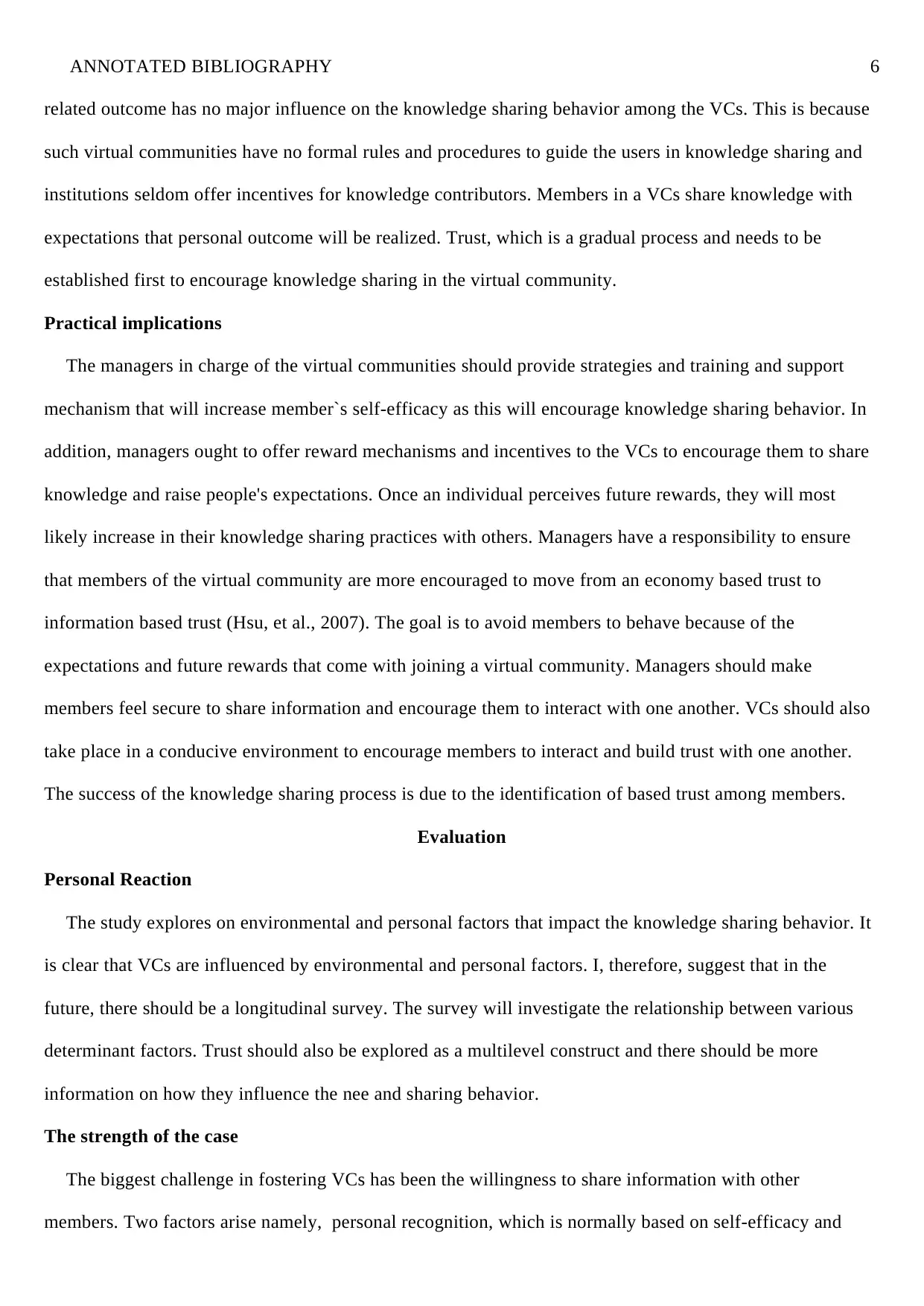
ANNOTATED BIBLIOGRAPHY 6
related outcome has no major influence on the knowledge sharing behavior among the VCs. This is because
such virtual communities have no formal rules and procedures to guide the users in knowledge sharing and
institutions seldom offer incentives for knowledge contributors. Members in a VCs share knowledge with
expectations that personal outcome will be realized. Trust, which is a gradual process and needs to be
established first to encourage knowledge sharing in the virtual community.
Practical implications
The managers in charge of the virtual communities should provide strategies and training and support
mechanism that will increase member`s self-efficacy as this will encourage knowledge sharing behavior. In
addition, managers ought to offer reward mechanisms and incentives to the VCs to encourage them to share
knowledge and raise people's expectations. Once an individual perceives future rewards, they will most
likely increase in their knowledge sharing practices with others. Managers have a responsibility to ensure
that members of the virtual community are more encouraged to move from an economy based trust to
information based trust (Hsu, et al., 2007). The goal is to avoid members to behave because of the
expectations and future rewards that come with joining a virtual community. Managers should make
members feel secure to share information and encourage them to interact with one another. VCs should also
take place in a conducive environment to encourage members to interact and build trust with one another.
The success of the knowledge sharing process is due to the identification of based trust among members.
Evaluation
Personal Reaction
The study explores on environmental and personal factors that impact the knowledge sharing behavior. It
is clear that VCs are influenced by environmental and personal factors. I, therefore, suggest that in the
future, there should be a longitudinal survey. The survey will investigate the relationship between various
determinant factors. Trust should also be explored as a multilevel construct and there should be more
information on how they influence the nee and sharing behavior.
The strength of the case
The biggest challenge in fostering VCs has been the willingness to share information with other
members. Two factors arise namely, personal recognition, which is normally based on self-efficacy and
related outcome has no major influence on the knowledge sharing behavior among the VCs. This is because
such virtual communities have no formal rules and procedures to guide the users in knowledge sharing and
institutions seldom offer incentives for knowledge contributors. Members in a VCs share knowledge with
expectations that personal outcome will be realized. Trust, which is a gradual process and needs to be
established first to encourage knowledge sharing in the virtual community.
Practical implications
The managers in charge of the virtual communities should provide strategies and training and support
mechanism that will increase member`s self-efficacy as this will encourage knowledge sharing behavior. In
addition, managers ought to offer reward mechanisms and incentives to the VCs to encourage them to share
knowledge and raise people's expectations. Once an individual perceives future rewards, they will most
likely increase in their knowledge sharing practices with others. Managers have a responsibility to ensure
that members of the virtual community are more encouraged to move from an economy based trust to
information based trust (Hsu, et al., 2007). The goal is to avoid members to behave because of the
expectations and future rewards that come with joining a virtual community. Managers should make
members feel secure to share information and encourage them to interact with one another. VCs should also
take place in a conducive environment to encourage members to interact and build trust with one another.
The success of the knowledge sharing process is due to the identification of based trust among members.
Evaluation
Personal Reaction
The study explores on environmental and personal factors that impact the knowledge sharing behavior. It
is clear that VCs are influenced by environmental and personal factors. I, therefore, suggest that in the
future, there should be a longitudinal survey. The survey will investigate the relationship between various
determinant factors. Trust should also be explored as a multilevel construct and there should be more
information on how they influence the nee and sharing behavior.
The strength of the case
The biggest challenge in fostering VCs has been the willingness to share information with other
members. Two factors arise namely, personal recognition, which is normally based on self-efficacy and
⊘ This is a preview!⊘
Do you want full access?
Subscribe today to unlock all pages.

Trusted by 1+ million students worldwide
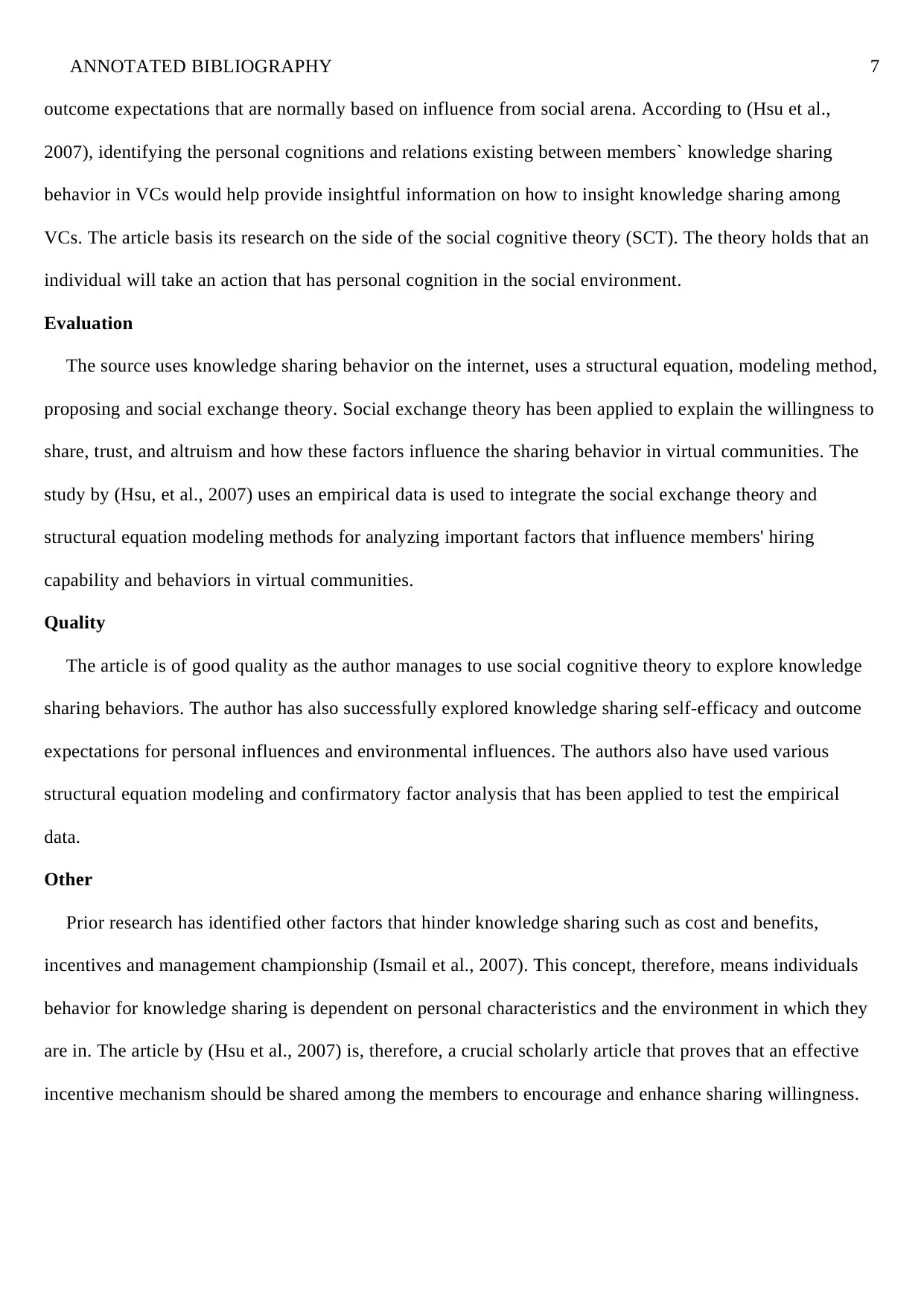
ANNOTATED BIBLIOGRAPHY 7
outcome expectations that are normally based on influence from social arena. According to (Hsu et al.,
2007), identifying the personal cognitions and relations existing between members` knowledge sharing
behavior in VCs would help provide insightful information on how to insight knowledge sharing among
VCs. The article basis its research on the side of the social cognitive theory (SCT). The theory holds that an
individual will take an action that has personal cognition in the social environment.
Evaluation
The source uses knowledge sharing behavior on the internet, uses a structural equation, modeling method,
proposing and social exchange theory. Social exchange theory has been applied to explain the willingness to
share, trust, and altruism and how these factors influence the sharing behavior in virtual communities. The
study by (Hsu, et al., 2007) uses an empirical data is used to integrate the social exchange theory and
structural equation modeling methods for analyzing important factors that influence members' hiring
capability and behaviors in virtual communities.
Quality
The article is of good quality as the author manages to use social cognitive theory to explore knowledge
sharing behaviors. The author has also successfully explored knowledge sharing self-efficacy and outcome
expectations for personal influences and environmental influences. The authors also have used various
structural equation modeling and confirmatory factor analysis that has been applied to test the empirical
data.
Other
Prior research has identified other factors that hinder knowledge sharing such as cost and benefits,
incentives and management championship (Ismail et al., 2007). This concept, therefore, means individuals
behavior for knowledge sharing is dependent on personal characteristics and the environment in which they
are in. The article by (Hsu et al., 2007) is, therefore, a crucial scholarly article that proves that an effective
incentive mechanism should be shared among the members to encourage and enhance sharing willingness.
outcome expectations that are normally based on influence from social arena. According to (Hsu et al.,
2007), identifying the personal cognitions and relations existing between members` knowledge sharing
behavior in VCs would help provide insightful information on how to insight knowledge sharing among
VCs. The article basis its research on the side of the social cognitive theory (SCT). The theory holds that an
individual will take an action that has personal cognition in the social environment.
Evaluation
The source uses knowledge sharing behavior on the internet, uses a structural equation, modeling method,
proposing and social exchange theory. Social exchange theory has been applied to explain the willingness to
share, trust, and altruism and how these factors influence the sharing behavior in virtual communities. The
study by (Hsu, et al., 2007) uses an empirical data is used to integrate the social exchange theory and
structural equation modeling methods for analyzing important factors that influence members' hiring
capability and behaviors in virtual communities.
Quality
The article is of good quality as the author manages to use social cognitive theory to explore knowledge
sharing behaviors. The author has also successfully explored knowledge sharing self-efficacy and outcome
expectations for personal influences and environmental influences. The authors also have used various
structural equation modeling and confirmatory factor analysis that has been applied to test the empirical
data.
Other
Prior research has identified other factors that hinder knowledge sharing such as cost and benefits,
incentives and management championship (Ismail et al., 2007). This concept, therefore, means individuals
behavior for knowledge sharing is dependent on personal characteristics and the environment in which they
are in. The article by (Hsu et al., 2007) is, therefore, a crucial scholarly article that proves that an effective
incentive mechanism should be shared among the members to encourage and enhance sharing willingness.
Paraphrase This Document
Need a fresh take? Get an instant paraphrase of this document with our AI Paraphraser

ANNOTATED BIBLIOGRAPHY 8
1 out of 8
Your All-in-One AI-Powered Toolkit for Academic Success.
+13062052269
info@desklib.com
Available 24*7 on WhatsApp / Email
![[object Object]](/_next/static/media/star-bottom.7253800d.svg)
Unlock your academic potential
© 2024 | Zucol Services PVT LTD | All rights reserved.


